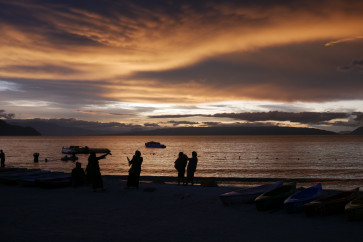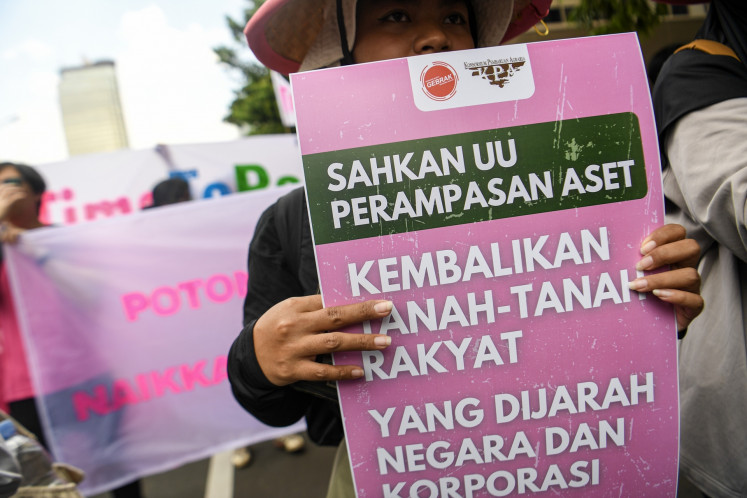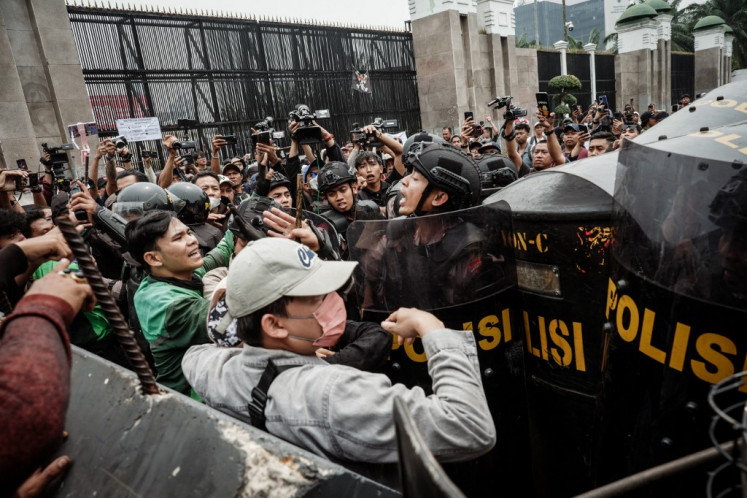Popular Reads
Top Results
Can't find what you're looking for?
View all search resultsPopular Reads
Top Results
Can't find what you're looking for?
View all search resultsOne decade on, ASEAN rights body struggles to find relevance
In Hua Hin, a seaside resort town on the Gulf of Thailand, a landmark regional human rights body for ASEAN was born on Oct
Change text size
Gift Premium Articles
to Anyone
I
n Hua Hin, a seaside resort town on the Gulf of Thailand, a landmark regional human rights body for ASEAN was born on Oct. 23, 2009, amid concerns that its birth was a result of countless compromises in a region with diverse political systems.
Since then, the ASEAN Intergovernmental Commission on Human Rights (AICHR) has been harshly criticized for its ineffective working methods and its lack of response to grave human rights violations in the region, even with the tools it has at its disposal.
The devil truly lurks in the details when it comes to explaining why the agency has stayed largely silent over concerns the region is backsliding on the protection of human rights. A mandate that has limited the AICHR’s ability to function in accordance with the principles of the ASEAN Human Rights Declaration is often cited as one of the biggest reasons.
Former foreign minister Hassan Wirajuda, who, during his tenure was actively involved in the development of the commission, said Indonesia only agreed to its establishment with the stipulation that the terms of reference (ToR) that regulate its mandate were to be reviewed within five years.
However, 10 years on, the AICHR is still working with the same ToR, which are often cherry-picked by its members, resulting in an overemphasis on its mandate to promote human rights but not on the one to protect them.
Hassan said the rights body needed a clear-cut mandate to receive complaints, investigate them and make its reports and recommendations public, arguing that even Indonesia’s National Human Rights Commission, which was established under the repressive Soeharto administration, had such a mandate.
He said as some of the ASEAN member states were under authoritarian regimes, it was clear why they were reluctant to review AICHR’s terms of reference.
“Those who are most afraid of a commission that can accept complaints are those that still adhere to a half-democratic system, or a single socialist or communist party, or military junta. They will not dare. That is the problem because of a different political system,” he told reporters on Tuesday.
ASEAN consists of countries with diverse political systems, from authoritarian rule to full-fledged democracy, which to a certain degree affects their level of commitment to freedom and human rights. Thailand, for example, has seen in the past decade alone both military and civilian rule, with former coup leader Prayut Chan-o-cha recently reinstalled as civilian premier.
Other countries like Vietnam, Cambodia, Laos and Myanmar have been ruled by different forms of authoritarian government, while the likes of Indonesia and Malaysia have elected their governments democratically.
The direct appointment of AICHR representatives has been cited by experts as one of the reasons why most of them remain reluctant to voice human rights concerns, as it could be viewed as going against their country’s national interests.
In order to conduct its activities, AICHR representatives are required to justify whether an activity is linked to one of the 14 mandates mentioned in its terms of reference, before coming to a consensus in determining the commission’s list of priority activities that year.
As an ASEAN body, decision making in the AICHR is based on consultation and consensus, whereby every member wields veto power over any item on the shared agenda.
The differences among political systems, coupled with ASEAN’s collegial way of operating, has resulted in a weak mandate to protect human rights in the region.
“AICHR in its current form is totally inadequate to address human rights in the region. Its silence on grave human rights violations such as abuses against the Rohingya people and enforced disappearances, shows how much the body urgently needs to be reformed,” said Kasit Piromya, a former Thai member of parliament and member of the board of the ASEAN Parliamentarians for Human Rights.
“As a first step it needs to review and strengthen its weak mandate and ensure that it selects independent and qualified representatives.”
Hassan argued that a change in AICHR would very much depend on the drive from Indonesia.
In the latest ASEAN Ministerial Meeting in Bangkok in late July, the then Indonesian foreign minister Retno LP Marsudi and Malaysian Foreign Minister Saifuddin Abdullah raised these concerns, suggesting the bloc should review AICHR’s ToR.
Indonesia’s representative to AICHR, Yuyun Wahyuningrum, who includes the ToR review in her agenda for the 2019 to 2020 period, said that a simple review is often a good start.
The AICHR representatives are due to meet again in Jakarta this November to discuss their strategies and determine what their plans are for the year ahead.
Indonesia’s first representative to AICHR, Rafendi Djamin, said, however, that a similar mechanism had previously been introduced in 2014, to the point where AICHR representatives had all agreed on a proposal to review the ASEAN body’s mandate.
However, the proposal was rejected at the ministerial level because of opposition from some countries. (tjs/ipa)










